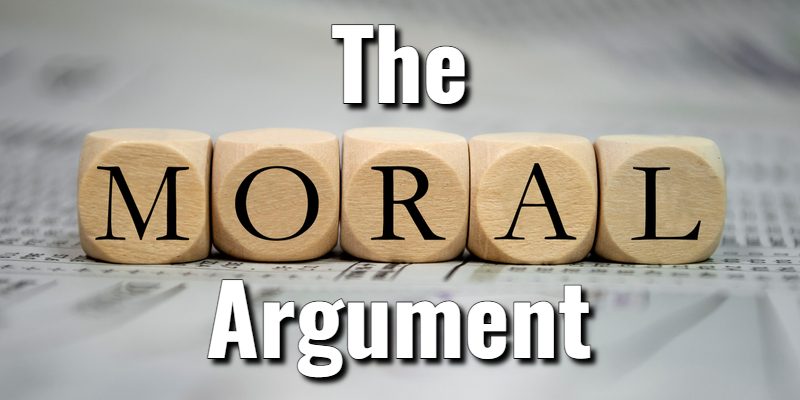Here’s a scenario for you. Your neighbor’s house is on fire, but she isn’t home, and the firefighters haven’t arrived yet. The babysitter made it out, but she’s injured and cannot go back in to rescue the infant she was minding. Also in the house is a rare Van Gogh painting that your neighbor inherited. You have just enough time to retrieve the baby or get the painting, not both. Which would you rescue? The answer should be obvious, but why is it obvious? On what are we grounding our innate understanding that we must save the baby rather than the painting? Christians would answer “God.” Apologists call this the moral argument for God’s existence. Christian philosopher William Lane Craig is well-known for outlining that argument like this:
Note here the claim is not that you can’t behave morally without God. The claim is that good or bad does not exist without some objective standard by which to measure it. God is that standard and goodness is inherent in His nature. Without a standard, even many atheists acknowledge that we are left with, at best, only moral preference.
Unlike other arguments for God’s existence that rely mainly on reason, the moral argument also appeals to emotions. It taps into the repulsion we feel at various heinous acts against others. The moral argument is not a new rebuttal in Christian apologetics, but the world’s moral relativism may make it more pertinent today than ever: A 2016 Barna Group poll showed that 57 percent of people in the U.S. believe that morality is based on personal experience.
In this view, no one cultural standard is morally superior to another. Those who hold this view probably don’t realize that its end can result in catastrophe. With no grounding, and no objective moral standards, what basis is there to consider an action good vs. evil? Taken to its logical conclusion, moral relativism can lead to unimaginable brutality.
The moral argument aptly repudiates today’s zeitgeist. To help you better grasp this classic argument for God’s existence, Lord’s Library editors compiled these resources on the moral argument to consider using.
Note: These resources on the moral argument are ordered from simple to more complex.
The Moral Argument in Christian Apologetics: Web Resources to Consider
The Moral Argument from drcraigvideos:
This five-minute animated video from William Lane Craig’s Reasonable Faith ministry concisely lays out the moral case for God’s existence. Craig did not invent the moral argument, but he has popularized it in debates with atheists. This video is short, and accessible, and uses analogies that make the topic easier to grasp for the regular person. This is a great place to start for those new to the argument. If you like Craig’s style and want to hear his more in-depth version of the argument, listen to his two-part lecture on the moral argument in his Defenders Series.
Kant’s Moral Argument from R.C. Sproul’s Renewing Your Mind
In this 26-minute lecture, late theologian R.C. Sproul comments on the moral argument as presented in eighteenth-century philosopher Emmanuel Kant’s Critique of Practical Reason. Unless you’re pursuing a degree in philosophy or theology, it’s unlikely that you’ll read Kant’s treatise. But Sproul has, and in this lecture, he does the heavy lifting for listeners, translating obscure theory into lucid commentary. He delves deeper into the moral argument than the Craig video here, so it’s a reasonable next step for beginners.
Blog Posts on the Moral Argument from Right Reason
Christian philosopher Glenn Andrews Peoples has written extensively on the moral argument in numerous blog posts. He presents a longer, more complex form of the argument than Craig. After you’ve seen Craig’s video and listened to Sproul’s lecture, you’ll be ready for Peoples’ more involved examination. Don’t worry, though; although Peoples is an academic, his posts are user-friendly for those who aren’t. If his blog posts whet your curiosity for more such content, check out his discussion of the moral argument and other theological/philosophical issues on his podcast Say Hello to My Little Friend.
Philosophers Debate the Moral Argument on the Unbelievable podcast with Justin Brierly
In this 2010 Unbelievable episode, atheist philosopher Arif Ahmed debates Christian philosopher Glenn Peoples about the moral argument. Ahmed does not concede the first premise of the argument–i.e., the existence of objective moral facts. This is at odds with some atheists who acknowledge that moral facts do exist. This episode will expose listeners to common objections to the moral argument and rebuttals to them, so it is a logical capstone to the other resources.
Final Thoughts
The moral grounding in God is something that Paul recognized. Under the inspiration of the Holy Spirit, Paul wrote in Romans 2:14-15: “For when the Gentiles, which have not the law, do by nature the things contained in the law, these, having not the law, are a law unto themselves: Which shew the work of the law written in their hearts, their conscience also bearing witness, and their thoughts the mean while accusing or else excusing one another;)”
We are made in the Imago Dei, the Image of God. We know what good and bad are because God has revealed Himself to us. Therein lies the basis of the moral argument.
NOW READ: Free Will vs. Determinism: Web Resources to Consider
Lord's Library participates in affiliate programs. We may make a small commission from products purchased through this resource.
- Intelligent Design vs. Evolution: Six Web Resources to Consider - October 3, 2023
- Microevolution vs. Macroevolution: Six Web Resources to Consider - September 9, 2023
- Atheist Objection to Theism #4: Presumption of Atheism Argument - August 21, 2023













